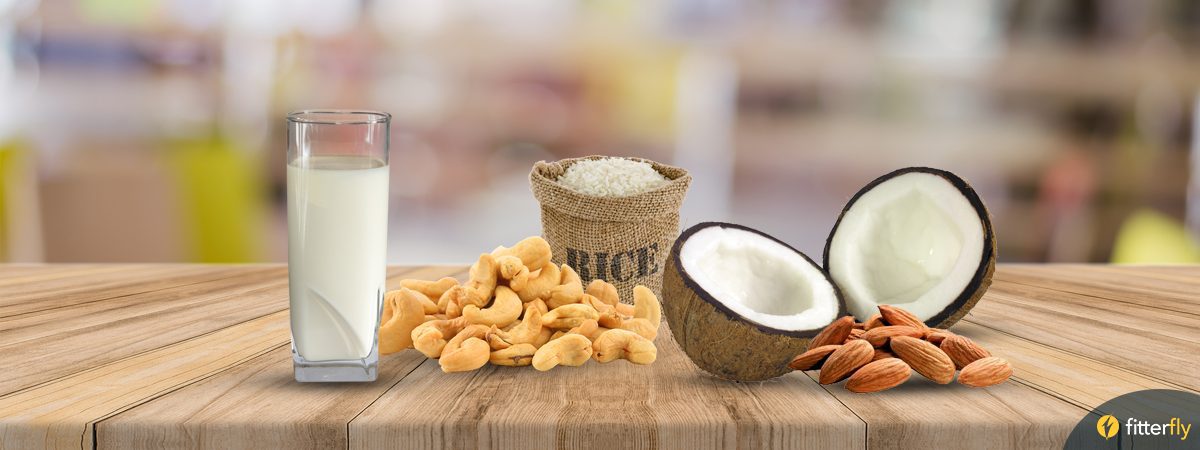Plant Milk – The New Way of Healthy Life

The rising incidence of cow’s milk allergy, lactose intolerance, and cholesterol disorders has increased consumer preference towards healthy milk alternatives. Nutritious foods in the market include a wide range of non-dairy beverages that can cater to the needs of vegetarians and vegans. Globally, plant-based milk substitutes have not only gained popularity in the functional and specialty beverage category but also have proven nutritional benefits.
Most of the plant-based substitutes cannot compete with exact same nutrients present in bovine milk but possess numerous other health benefits that attract health-conscious individuals.
Types of plant-based milk alternatives:
- Cereal-based: Rice milk, corn milk, Spelt milk, Oats milk, Quinoa milk, Amaranth milk and Teff milk.
- Legume-based: Cowpea milk, Soya milk, Lupin Milk.
- Nut-based: Peanut milk, Coconut milk, Almond milk, Hazelnut milk, Cashewnut milk, Walnut milk and Pistachio milk
- Seed-based: Sunflower milk, Flax milk, Sesame milk and Hemp milk.
Let us know more about few of them in details based on studies available:
- Soya milk: Soy milk is bland in taste but easy to blend, hence can be readily used as a milk substitute. It is used with other flavorings like natural coco, vanilla etc for healthy and yummy smoothies and milkshakes. Nutritionally soybean is rich in proteins, phytoestrogens, omega-6 fatty acids, omega-3 fatty acids, B-complex vitamins, folic acid, minerals like zinc, phosphorous and magnesium etc. Bioactive components like isoflavones and phytoestrogens play a protective role against heart diseases, osteoporosis, and cancer. However, many may be allergic to soy proteins and consumption must be considered accordingly.
- Coconut milk: Coconut is considered as God’s blessing in South India and has a wide range of uses in Asian Cuisine. Coconut milk is lighter than animal milk and has a high concentration of medium chain triglycerides extremely beneficial in digestive issues. Compared to many other plant-based milk alternatives, coconut milk is rich in essential nutrients like calcium, zinc, Vitamin E, potassium, sodium and Vitamin C. The bioactive component Lauric acid present in coconut milk helps boost immunity and maintains elasticity of blood vessels.
- Almond milk: With no lactose and cholesterol, it is energy dense, high in protein, fiber, magnesium, zinc, folic acid, Vitamin E and B-complex vitamins. Nutritionally highly beneficial, it helps in vision improvement, healthy heart, strong bones and weight loss. It is considered as one of the best alternatives for individuals with cow’s milk allergy and lactose intolerance. The bioactive component Alpha-tocopherol is a powerful antioxidant that helps in scavenging free radical reactions. The prebiotic property of arabinose present in almonds reduces blood cholesterol levels of the body. Almond proteins can be a cause of allergy and hence intake should be considered accordingly.
- Rice milk: Rice milk is an excellent source of phytosterols, especially b-sitosterol, c-oryzanol, starch, carbohydrates with no gluten, no cholesterol, and low sodium. It is a great milk substitute for individuals on weight loss, diabetic, hypertensive and digestion disorders. It can be the best milk substitute for children with diarrhea and liver disorders.
- Oats milk: With many other types of milk available in the market, one such therapeutic milk is Oat milk. The bioactive component B-glucan is rich in soluble fiber and has multiple health benefits. The thick viscous solution of the milk delays gastric emptying by providing satiety. It helps reduce blood sugar levels and keeps a check on deranged cholesterol.
- Peanut milk: It is pocket-friendly plant-based milk alternatively used in many developing nations to treat malnutrition. Peanuts or groundnuts contain proteins, fiber, zinc, folic acid, copper, B-complex vitamins, phytosterols and antioxidants that keep blood sugar levels and lipids levels in check. The phenolic compounds present in peanuts helps in preventing heart diseases, cancer by scavenging free radicles.
- Sesame milk: Sesame seeds or gingelly seeds are one of the richest oilseeds in the world. It is commonly known as “til’ seeds in India and is used in making various sweet and savory preparations. Rich in nutrients like proteins, calcium, iron, folic acid, zinc, copper, omega-3 fatty acids, fiber and many other essential elements. Bioactive compounds present in sesame include sesamin, sesamolin and sesaminol have hypocholesterolemic, anti-carcinogenic and anti-tumor properties.
TRY A NEW WAY TO TURN HEALTHY THIS SEASON!!!!
About Fitterfly:
FitterFly is a first of its kind, a child centric fitness and nutrition venture that provides integrated tech enabled personalized services to children and their families across India.
We aim at following one simple principle – Every Child should be in the best of its Health and be 360 degrees Fit.
FitterFly has been initiated by doctors with more than 40 years of healthcare experience, best child dietitians, and pediatric nutritionists in India, child fitness trainers, and senior technologists.
At FitterFly, we make sure that your child remains in the best of his heath and spirit.
At FitterFly, we offer customized nutrition/diet advice and plans for children.
This blog provides general information for educational and informational purposes only and shouldn't be seen as professional advice.












